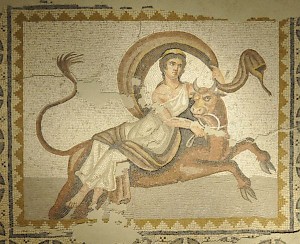Ovid on the Abduction of Europa
Tyre (Phoenician רצ, ṣūr, "rock"; Greek Τύρος; Latin Tyrus): port in Phoenicia and one of the main cities in the eastern Mediterranean.

To the Greeks, Tyre was the main city of Phoenicia, a country from which they believed to have borrowed many aspects of their culture. In legendary times, the king of this land had been Agenor, the father of Cadmus and Europa, one of the lovers of Zeus. In his Metamorphoses, the Roman poet Ovid (43 BCE - 17 CE) tells how Zeus, who had taken on the shape of a bull, had abducted the Phoenician princess, who was to be the mother of Minos and Sarpedon. Cadmus, who searched for his sister, was to settle in Greece, and would become the founder of the city of Thebes.
Metamorphoses 2.844-875 is offered here in the translation by A.S. Kline.
Ovid: the Abduction of Europa
[2.844-851] ... the shore, where the great king's daughter, Europa, used to play together with the Tyrian virgins. Royalty and love do not sit well together, nor stay long in the same house. So the father and ruler of the gods [i.e., Zeus/Jupiter], who is armed with the three-forked lightning in his right hand, whose nod shakes the world, setting aside his royal sceptre, took on the shape of a bull, lowed among the other cattle, and, beautiful to look at, wandered in the tender grass.
[2.852-858] In color he was white as the snow that rough feet have not trampled and the rain-filled south wind has not melted. The muscles rounded out his neck, the dewlaps hung down in front, the horns were twisted, but one might argue they were made by hand, purer and brighter than pearl. His forehead was not fearful, his eyes were not formidable, and his expression was peaceful.
[2.858-868] Agenor's daughter marvelled at how beautiful he was and how unthreatening. But though he seemed so gentle she was afraid at first to touch him. Soon she drew close and held flowers out to his glistening mouth. The lover was joyful and while he waited for his hoped-for pleasure he kissed her hands. He could scarcely separate then from now. At one moment he frolics and runs riot in the grass, at another he lies down, white as snow on the yellow sands. When her fear has gradually lessened he offers his chest now for virgin hands to pat and now his horns to twine with fresh wreaths of flowers.
[2.868-875] The royal virgin even dares to sit on the bull’s back, not realising whom she presses on, while the god, first from dry land and then from the shoreline, gradually slips his deceitful hooves into the waves. Then he goes further out and carries his prize over the mid-surface of the sea. She is terrified and looks back at the abandoned shore she has been stolen from and her right hand grips a horn, the other his back, her clothes fluttering, winding, behind her in the breeze.